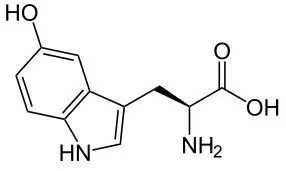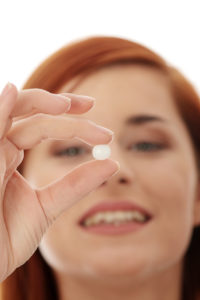Table of Contents
5-HTP (5-Hydroxytryptophan or oxitriptan) is an amino acid that is naturally produced in your body. 5-HTP is synthesized from the amino acid tryptophan which we get from food.
5-HTP is the immediate precursor of serotonin. And as a nootropic and dietary supplement, 5-HTP is popular with those who advocate its effectiveness in treating depression. Along with a number of other serotonin-related diseases.
But using 5-HTP for treating depression and anxiety is not supported by science. The research is contrary to how 5-HTP is viewed by many, including medical doctors.
When we dig into the research, we find that 5-HTP may be contraindicated for depression in those whom marketers advocate its use.[i]
We’re all for boosting neurotransmitter levels and optimizing cognitive performance here at Nootropics Expert®. But now and again I run into a nootropic or dietary supplement that may be popular. But also may be a particularly bad idea.
We’re going to get to the bottom of how 5-HTP works in your brain in this review. We’ll examine why it’s critical for brain health. And reasons why you may want to find another way to boost serotonin levels in your brain.
5-HTP helps:
- Anxiety & Depression. 5-HTP is synthesized into serotonin in brain cells. Elevating levels of serotonin can help relieve the symptoms of anxiety and depression.
- Neurotransmitters. 5-HTP is a necessary ingredient for serotonin synthesis which boosts mood and social behavior, improves memory, regulates appetite and digestion, sleep, sexual desire and function.
- Brain Optimization. A critical balance of the primary neurotransmitters serotonin and dopamine are needed for the highly optimized brain. When these neurotransmitters are not in balance it affects mood, memory, cognition, decision-making, sexual desire, and a host of other critical life functions.
Overview
5-HTP (5-Hydroxytryptophan or oxitriptan) is an amino acid that’s synthesized from the essential amino acid tryptophan.

Tryptophan is hydroxylated by tryptophan hydroxylase to 5-HTP (5-hydroxytryptophan), then decarboxylated to serotonin (5-hydroxytryptamine or 5-HT).[ii]
Tryptophan → 5-HTP → serotonin
80-90% of your body’s serotonin is made in your intestines. But serotonin cannot cross the blood-brain barrier. So all the serotonin that your brain needs has to be made within the brain. This is where 5-HTP comes in…
5-HTP crosses the blood-brain barrier more readily than tryptophan. And gets synthesized into serotonin at a faster rate than from tryptophan.[iii]
As a neurotransmitter, serotonin influences directly and indirectly, the majority of brain cells. So if you want to boost serotonin in your brain, some find that supplementing with 5-HTP is better than taking tryptophan.
Tryptophan, which your body uses to make 5-HTP, can be found in turkey, chicken, milk, potatoes, pumpkin, sunflower seeds, turnip and collard greens, and seaweed.
5-HTP as a nootropic supplement is a naturally occurring amino acid derived from seed pods of Griffonia simplicifolia, found in West and Central Africa. 5-HTP content in extracts of this plant vary from 2 – 20.83% (from seeds obtained in Ghana).[iv]
How does 5-HTP work in the Brain?
5-HTP is a precursor to serotonin. The neurotransmitter serotonin plays a role in sleep, appetite, learning & memory, mood, and sexual function.
When tryptophan’s role in converting to 5-HTP for boosting serotonin doesn’t work efficiently, the result is often depression, chronic headache and insomnia.
An open-label trial was conducted in Italy to determine the efficacy of using 5-HTP in young subjects with high levels of “romantic stress”.
Serotonin has been linked to human romantic attachment. So researchers in this study set out to determine brain levels of Brain-Derived Neurotrophic Factor (BDNF) and serotonin in relation to changes in romantic stress during the study.
15 healthy subjects (mean age 23.3 years) who had a “romantic breakup” took part in the study. Participants received 60 mg of Griffonia simplicifolia extract containing 12.8 mg 5-HTP daily for 6 weeks.
The subjects were evaluated for BDNF and serotonin levels at the beginning of the study, at 3 weeks and then again at the end of the 6-week trial.
The scientists observed significant improvements in romantic stress scores from weeks 0 through 3. So far, 5-HTP seems to be working. But no further improvement was seen from weeks 3 through 6. Even though the young people had significantly higher levels of BDNF and serotonin.[v]
More Involved in Depression and Stress than Serotonin
This “romantic breakup” study is a classic illustration of why using 5-HTP alone to treat depression and stress may not work. And if it does work, why it may not work for long.
Depression is often more than simple serotonin dysfunction. Depression can also be associated with catecholamine dysfunction, including dopamine and/or norepinephrine. Or a combination of serotonin and catecholamine dysfunction.
When you take 5-HTP alone, you are also depleting dopamine, norepinephrine, and epinephrine. Synthesis of serotonin from 5-HTP, and dopamine from L-DOPA is catalyzed by the same enzyme, L-aromatic amino acid decarboxylase (AAAD).
Dopamine and serotonin precursor supplementation must be taken in proper balance. Because when you use only 5-HTP, it dominates dopamine at the AAAD enzyme synthesis level.
Blocking dopamine synthesis at the AAAD enzyme through competitive inhibition will lead to depletion of dopamine and the rest of the catecholamines.[vi]
Going back to our Italian study of young people dealing with “romantic stress”, the subjects stopped responding to 5-HTP in the 2nd half of the study. Likely because their catecholamines became depleted through continuous 5-HTP supplementation.
Studies have found that when dopamine is depleted enough, 5-HTP will no longer function.[vii]
Catecholamine Dysfunction Affects More Than Just Depression
When catecholamine neurotransmitter levels (dopamine and/or norepinephrine) influence depression, supplementing with 5-HTP alone is not the way to go. Because you may deplete dopamine and norepinephrine, worsening the disease and its underlying cause.
But this contraindication is not exclusive to depression. It extends to all other diseases where catecholamine dysfunction has been implicated. Including ADHD[viii], obesity, anxiety, seasonal affective disorder (SAD), and Parkinson’s Disease.[ix]
How things go bad
 Amino acid precursors of serotonin (i.e. 5-HTP) and dopamine (i.e. L-Tyrosine) work together during synthesis, metabolism and transport to the point that they function as one system.
Amino acid precursors of serotonin (i.e. 5-HTP) and dopamine (i.e. L-Tyrosine) work together during synthesis, metabolism and transport to the point that they function as one system.
When serotonin and dopamine are properly balanced, functions that are regulated only by serotonin, can be regulated by manipulating dopamine levels. And functions regulated only by dopamine in this balanced state can be regulated by manipulating serotonin.[x]
When you mess with this balance and improperly supplement with serotonin or dopamine precursors, you don’t get the desired effect of using that nootropic. And you increase the possibility of side effects with too much serotonin.
If you supplement with only one precursor (i.e. 5-HTP to boost serotonin) that dominates the other system (i.e. dopamine synthesis), depletion of the dominated system will occur (i.e. depleted dopamine).
And if this effect is pronounced enough, you will not get the benefit you were aiming for when supplementing with the original precursor (i.e. 5-HTP).
A powerful example of this effect is in the management of Parkinson’s Disease where the effects of L-DOPA are no longer observed over time due to serotonin depletion.[xi]
Since serotonin and dopamine cannot cross the blood-brain barrier, the number of serotonin and dopamine molecules in the brain is a function of the amount of nutrients (amino acid precursors) that are available to be synthesized into new neurotransmitter molecules.
Optimizing brain function with minimal side effects is NOT a function of supplementing until you get sufficiently high amino acid levels. It’s a function of achieving the proper balance between serotonin and dopamine.
5-HTP benefits
5-HTP is absolutely critical for synthesis of serotonin in your brain. But supplementing with 5-HTP to boost serotonin does not work well.
Using 5-HTP to treat depression has had very little success over the last few decades of clinical trials and biohacking.
Integrating 5-HTP into your nootropic stack is much more complicated than simply adding some 5-HTP in order to boost serotonin.
5-HTP alone will not work for depression, or any other issue you’re dealing with involving the catecholamines (dopamine, norepinephrine, epinephrine) because of 5-HTP’s tendency to deplete those neurotransmitters.
5-HTP will boost serotonin in your brain.[xii] But 5-HTP must be carefully stacked with precursors for dopamine and norepinephrine or you risk making the situation worse.
You must avoid supplementing with only one of the serotonin or dopamine amino acid precursors. When amino acid precursors are not in balance, you end up with decreased effectiveness of that nootropic, increased side effects, and depletion of the non-dominant system.
How does 5-HTP feel?
Reactions to supplementing with 5-HTP vary considerably but the one consistent theme is initial feelings of well-being, better sleep, less need for sleep, improved mood, less social anxiety, lower appetite, improved tolerance for stress and improved cognitive function.
And after a couple of weeks of dosing 5-HTP – side effects begin. Serotonin overload results in dopamine and norepinephrine depletion.
Side effects include feelings of lethargy, depression, brain fog, stomach pain, and possibly a chronic tension type of headache. Worst case scenario is nausea, vomiting and even blacking out.
Neurohackers who report consistent success supplementing with 5-HTP stack it with B-Vitamins, a dopamine precursor like L-Tyrosine, and only use 5-HTP as needed.
Those who have a bad experience with 5-HTP from the start often have no idea why they’ve reacted badly. But an educated guess is their depression was catecholamine (dopamine, norepinephrine, epinephrine)-related. And boosting serotonin made their dopamine-related issues worse. Very quickly.
One huge word of WARNING: Do NOT take 5-HTP with any antidepressant medication. You put yourself in the very real danger of Serotonin Syndrome which can ultimately kill you.
5-HTP Clinical Research
5-HTP supplements are heavily marketed as a natural remedy for depression. But the science does not support using 5-HTP for depression. We have decades of clinical trials available. And there is no evidence of the efficacy in using 5-HTP for depression.
5-HTP instead of selective serotonin reuptake inhibitors
The Department of Public Health at the University of Queensland Medical School in Australia did a systematic review of literature dating from 1966 – 2000 for “5-HTP” and “depression”.
The researchers found 108 clinical studies of which only 2 studies, one with serotonin (5-HT) and one with L-Tryptophan for a total of 64 patients met sufficient quality criteria to be included. These studies suggest serotonin (5-HT) and L-Tryptophan are better than placebo at alleviating depression.
But the researchers noted “the small size of the studies, and the large number of inadmissible, poorly executed studies, cast doubt on the results from potential publication bias, and suggests that they are insufficiently evaluated to assess their effectiveness.”[xiii]
5-HTP for Fibromyalgia
A double blind controlled study in Italy studied the efficacy of using 5-HTP in treating fibromyalgia symptoms.
50 patients with primary fibromyalgia syndrome were selected for this study. This 1990 study did not publish the amount of 5-HTP used. But the researchers found a significant improvement in fibromyalgia symptoms with only mild and transient side effects.[xiv]
5-HTP for Treatment of Depression
Insufficient activity of the neurotransmitters serotonin and norepinephrine is a central element of the model of depression most widely held by neurobiologists today.
In the late 1970’s and 1980’s, numerous studies were performed in which depressed patients were treated with the serotonin precursors L-Tryptophan and 5-Hydroxytryptophan (5-HTP), and the dopamine and norepinephrine precursors Tyrosine and L-Phenylalanine.
A summary published in the Alternative Medicine Revue looked at the data from all these studies. The author noted that the nature of the studies makes it difficult to draw firm conclusions regarding the efficacy of neurotransmitter precursors for treating depression.
While there is evidence that precursor loading could work, particularly for serotonin precursor 5-HTP, more studies of suitable design and size “might lead to more conclusive results”.[xv]
Those studies have not materialized since that report was published 22 years ago.
5-HTP Recommended Dosage
Recommended dosage of 5-HTP if you’re going to try it is 50 mg 1 – 3 times per day.
Some studies have used higher doses than the recommended dose, but 5-HTP can be toxic for your central nervous system at high doses.
For anxiety or depression, 5-HTP is dosed at 150 – 300 mg per day total.
To relieve post MDMA (Ecstasy) depression, 5-HTP 100 mg on Day 3-7 after MDMA use.[xvi]
Successfully supplementing with 5-HTP requires stacking it with a dopamine precursor like L-Tyrosine or L-DOPA along with B-Vitamins (for synthesis), and one of the sulfur-containing amino acids (methionine, cysteine, homocysteine, or taurine).
And you must monitor the effects this stack is having on your body. If you start experiencing side effects of any kind, it’s a good indication that either serotonin or dopamine is out of balance.
DO NOT combine 5-HTP with any kind of antidepressant medication.
Combining SSRI’s, Tricyclics or MAOI’s with 5-HTP will cause Serotonin Syndrome. An extremely dangerous condition involving severe mental changes, hot flashes, rapidly fluctuating blood pressure and heart rate, and possibly coma leading to death.
Serotonin Syndrome can kill you. And I’m not kidding here.
5-HTP Side Effects
5-HTP supplementation can cause heartburn, heart palpitations, headache, stomach pain, nausea, vomiting, diarrhea, drowsiness, sexual problems and muscle issues.
5-HTP can also cause some pretty radical mood changes including agitation, aggressiveness, anxiety, euphoria, poor decision-making, irritability, psychosis, restlessness and insomnia.
5-HTP can make the symptoms of schizophrenia, bipolar disorder and other mental disorders worse.
Serotonin Syndrome
And I can’t emphasize this enough so I’m going to repeat it here in case you missed it…
DO NOT combine 5-HTP with any kind of antidepressant medication. Or with carbidopa.
Combining SSRI’s, Tricyclics or MAOI’s with 5-HTP will cause Serotonin Syndrome. An extremely dangerous condition involving severe mental changes, hot flashes, rapidly fluctuating blood pressure and heart rate, and possibly coma.
And combining 5-HTP with carbidopa also has the potential of causing Serotonin Syndrome.
Serotonin Syndrome can kill you. And I’m not kidding here.
Type of 5-HTP to Buy
5-HTP is made from tryptophan in your body.
5-HTP as a nootropic supplement is made from extracts of the African tree Griffonia simplicifolia. 5-HTP supplements are typically in tablet or capsule form.
You’ll often find 5-HTP in many ready-made vitamin and herbal formulas.
If you are going to stack low-dose 5-HTP with L-Tyrosine I suggest: Natrol 5-HTP Fast Dissolve Tablets (Amazon). Cut the 100 mg tablet into quarters using a pill splitter and dissolve 25 mg 5-HTP under your tongue (sublingually).
Nootropics Expert Recommendation
5-HTP 50 mg up to 3-times per day
 I DO NOT recommend using 5-HTP as a nootropic supplement.
I DO NOT recommend using 5-HTP as a nootropic supplement.
Your body does synthesize 5-HTP on its own to make serotonin in your brain. And you can’t get 5-HTP from food. But you can get L-Tryptophan from food which is synthesized into 5-HTP in your body.
5-HTP may help you if you’re dealing with depression. But you must stack if with a dopamine amino acid precursor along with B-Vitamins and a sulfur-containing amino acid. See the “5-HTP Recommended Dosage” in this review above.
IF you are going to try 5-HTP, I suggest starting with a dose of more than 50 mg daily. You may want to take it in the evening because it could help sleep disorders.
Short-term dosing of 5-HTP of no more than 2 weeks seems to provide the most benefit if you’re going to benefit from this nootropic.
Or try using 5-HTP only on an “as needed” basis. For a mood boost, reduce social anxiety, and provide a short-term boost in cognition.
5-HTP supplementation on its own is NOT recommended. Nor is it recommended for long-term use.











Join The Discussion - 359 comments
candide
August 9, 2020
Hi, quick question. I basically accepted it as dogma from other sources that 5-HTP absolutely should /not/ be taken without EGCG or some green tea in general, the reason being that otherwise it would convert into serotonin in the gut and, besides not reaching the brain, could also damage the heart. Is this true? How necessary might it be to also supplement vitamin B6 with these two?
Thank you
David Tomen
August 9, 2020
Candide, most of your serotonin is made in your gut and somehow gets to your brain. I think via the vagus nerve but can’t prove it.
Where people get into trouble with 5-HTP is using only 5-HTP with the expectation that it will work as an antidepressant. And it stops working after 4 – 6 weeks. What they don’t realize is that when you boost serotonin too much you depress dopamine. Which in turn causes depression. And a host of other problems.
You also need Vitamins B3, B5, B6, B9 & B12 which are cofactors in the synthesis of serotonin. Not sure where they came up with the idea about EGCG. But green tea does contain L-Theanine which does influence dopamine levels.
And if you’re too depressed possibly from a lack of serotonin you could die of a broken heart I suppose. Maybe they got it from there? 🙂
Jorge Alonzo
August 29, 2020
Hello!
So hopefully you’re able to read this in the right section, I wasn’t sure where to post a new thread.
I’ve ordered a few things and I would like to know if it’s appropriate to mix these all together and I will also let you know my diet usually and also my workouts.
Hopefully you can help me take a look at the actual items
I’m 29 years old I vape so there’s nicotine.
I ordered Vitamins
Animal Pak – The Complete All-in-one Training Pack – Multivitamins for Men
I ordered probiotics
DrFormulas’ Best Probiotics for Women & Men
I ordered 5-HTP
Natrol 5-HTP
I ordered Alpha-GPC
Double Wood Alpha GPC
Alpha-GPC 600mg but i want to take half as well as with 5 HTC 200mg to 100mg
I eat oatmeal peanut butter bananas
Then eggs with avocado and cheese
I usually workout for an hour of weights than go on a 2 mile jog
Protein shake after
Late lunch and dinner can vary from different red meats chicken seafood with varying veggies
I just want to know if it’s safe to these on a daily. I’m more worried about the 5-HTP and my reason for it, is to not be soooo anxious. I might be a little depressed so I thought that can help instead of Lexipro. I read that you need something for the other side and treat the dopamine levels too. But I thought probiotics and my vitamins will take care of that as well as my usually workout routine where I feel good after them.
Thanks so much and I’m looking forward to read more on this site.
Jorge Alonzo
August 29, 2020
Oops forgot about creatine….I take creatine. 6grams a day. I drink plenty of water!
Thanks!!
David Tomen
August 31, 2020
Jorge, the only thing on your list that I think safe to use and possibly effective for you is Alpha GPC. It will help with learning and memory and does indirectly influence dopamine levels.
The multivitamin is a classic example of what is wrong with the vitamin/mineral market. Half the contents are synthetic and the company included everything but the kitchen sink in that formula. If you take it and something goes wrong you’ll have no idea why. Because it could be a side effect of any of the dozens of ingredients in that formula.
If you are looking for an effective Multi I highly suggest better quality and use the one I’ve been using for the last two years. The Performance Lab NutriGenesis Multi for men which you’ll find here: https://www.performancelab.com/products/nutrigenesis-multi-men
The problem with probiotics is you have no idea what your gut needs. Out of over 12,000 different good bacteria you’re taking a chance that the few that are in that supplement are the correct ones. I think as wiser approach is to feed your exiting microbiome and let it sort things out. You do that with this: https://www.performancelab.com/products/prebiotic
5-HTP is almost never a good idea because it is direct precursor to the synthesis of serotonin. The Natrol 5-HTP supplement uses a 200 mg dose. Which is very high. Especially if serotonin isn’t even your issue.
Anxiety may be caused by any one of the major neurotransmitters in your brain being out of balance, or low. And the only way to know which one is test each one. One at a time. This article will walk you through how to do it: https://nootropicsexpert.com/best-nootropics-for-anxiety/.
If you want to try something that’s effective for taming anxiety and lifting mild depression you’re better off trying something like Lemon Balm while trying to figure the rest of this out: https://nootropicsexpert.com/lemon-balm/
Peter
July 27, 2020
Hi David,
I am currently experimenting with nootropics for anxiety and recently started to take Lavender oil (Silexan), which seems to be very good.
However, I have added another supplement called Triptozin (L-tryptophan (170 mg), 5-HTP (50 mg), Magnesium (50 mg) and B6 (0.9 mg).
After the first take it makes me extremely anxious and irritable, so I wasn’t able to sleep. About 4 hours later I have taken another supplement for Sleep, which I also though to try before (it’s my first time) containing 70 mg Lemon Balm and 140 mg Californian Poppy.
On the next day, I have triggered several panic attacks, unexplainable severe anxiety, my mind was racing even without thoughts. Five days later, these side effects do continue (probably a slightly lower).
Do you think I might developed Serotonin Syndrome from the combination of both supplements or it’s most probably a side effect, which will subside with time?
I have had similar effect before from another 5-HTP supplement (25-50 mg), but it does subside on the next day.
David Tomen
July 27, 2020
Peter, I’m almost certain that you’re experiencing the negative effects of 5-HTP. And the reason I do not recommend anyone use 5-HTP. Especially considering that most supplement labels that include 5-HTP claim a dosage that is nothing like what is actually in the capsule.
You may want to stop using anything that affects serotonin and/or melatonin for a few days to let your system settle down. You might be able to counter some of the effects with low dose L-Tyrosine (i.e. 500 mg).
Lesson here is to AVOID anything containing 5-HTP.
Peter
July 28, 2020
Hi David,
Thanks for the reply. I will never ever use something serotonergic again, especially 5-HTP.
Do you think whether these side effects will subside with time or it will lead to more serious lasting consequences?
I have some L-Tyrosine, but I am hyperthyroid and I am worried about it’s effects on thyroid.
Is there something else what can I do to lower the serotonin faster as it’s seems to be the problem?
As far as I see, I am generating a lot adrenaline, which cause me muscle twitching, a lot of anxiety, irritability etc.
Much appreciated about information.
David Tomen
July 28, 2020
Peter, check my post on social anxiety because I just updated the “serotonin” section: https://nootropicsexpert.com/best-nootropics-for-social-anxiety/. Last paragraph of that section.
I wouldn’t worry about this to much because your brain has an amazing ability to heal itself. Symptoms should subside over time. I’m severely hypothyroid but use 500 mg L-Tyrosine 3-times per day without any problem. We’re all different so I can’t guarantee that will be your experience. But it works for me.
Peter
July 29, 2020
Hi David,
Thanks again for the answer. It does provide me a bit of a relief.
Regarding the L-tyrosine, I’d like to use it a lot, as I have a very good experience for a short period of time in terms of mood boost with it.
However, I guess if you are hypothyroid is fine (as it will boost thyroid function?), but what about hyperthyroid, which is my case? Will it elevate T3 and T4 on dose like 500 mg? As both of these are on the upper limit?
David Tomen
July 29, 2020
Peter, honestly there’s no way to know unless you try it. You know what “hyper” symptoms feel like. Try L-Tyrosine and see if you go hyper. Unless for some reason your system goes permanently into hyper-drive. Only you can make this decision if it’s worth it to you to experiment with it.
Beth Armstrong
July 6, 2020
Humble request for your expertise my friend. I am currently taking l-theanine (150mg)with 5-HTP (100mg) 3 times a day along with coffee. I am taking l-theanine because it hopefully counteracts the dopamine blocking effects of 5-HPT. I have recently come across your article on 5-HPT and it was an eye-opener to say the least!
My questions are…
1) does my l-theanine dosage produce enough dopamine to counteract 5-HTP dopamine depletion. Will these 2 supplements together provide a dopamine-serotonin balance in my brain. I also eat 4 eggs & an avocado every day to help with my L-Tyrosine levels
2) as they are both amino acids – can they neutralise each other when taken together
3) is there any research to suggest that taking l-theanine or 5-HTP subliminally is better than swallowing the capsule.
Many thanks for your time and sharing your knowledge!
David Tomen
July 6, 2020
Beth, L-Theanine boosts the effectiveness of dopamine that’s already present in your brain. It doesn’t create new dopamine.
5-HTP on the other hand does create new serotonin. And used long enough will depress dopamine. That’s why high dosages of 5-HTP are not a good idea and why it stops working after a few weeks.
The only way to increase dopamine to counter this effect is by supplementing with L-Tyrosine. Eggs are not enough.
And amino acids don’t “neutralize” each other. But amino acids in your food can compete for transporters in your gut with amino acids you are taking as supplements. Which is why it’s better to take some supplements on an empty stomach an hour before you eat anything.
L-Theanine however, is a great way to counter the side effects of caffeine use because it helps balance neurotransmitters affected by caffeine. And it helps suppress cortisol that is raised by using caffeine.
Beth Armstrong
July 6, 2020
WOW – Thank you David! May I ask how much L-Tyrosine I need to take as a supplement while I am taking this dose of 5-HTP as I will order some today. Also if I supplement with L-Tyrosine will that allow the 5-HPT to continue “working” even after the 3 week mark where 5HPT seems to cease functioning & dopamine depletion usually occur. Also as I already take Magnesium, Vit B’s daily, can I order just straight L-Tyrosine. Again MANY THANKS for your help. PS I am taking 5hpt for irritability, aggression, OCD & impulse control, mood & sleep and I have noticed significant improvements in each and my Bulimia had stopped altogether after 30 years. I have only been taking 5-HTP & l-theanine for a week though but am very impressed with how it is effecting me so far. Your guidance is much appreciated David…
David Tomen
July 7, 2020
Beth, you can use L-Tyrosine as a single supplement. But dosage entirely depends on how much your system needs. For example, the recommended dosage for L-Tyrosine is 500 mg 2 or 3-times per day. But that dosage could be too much for you. You may only need 250 mg at a time. Only way to know is to experiment.
But don’t take L-Tyrosine too late in the day as it could mess with your sleep.
Varun Chawla
April 19, 2020
Great video & article David. Just have a QQ:
Can I take 5-HTP(With CO-Factor b6) along with my ADHD medication (Adderall 20mg )?
David Tomen
April 20, 2020
Varum, why would you want to? Have you seem my post on ADHD here? https://nootropicsexpert.com/best-nootropics-for-adhd-add/
Nic
April 13, 2020
Hi, I have found 5htp greatly improves my anxiety and mood. I have only ever taken it for up to 10 days in low dose due to the fact thst both times I have ended up with a mouth ulcer/sore on my lip.. and the feeling of getting a stomach ulcer. Is this ulcer occurence caused by the 5htp. Would l-tryptophan result in the same. Maybe its a coincidence. Thanks, nic
David Tomen
April 23, 2020
Nic, its possible. The pathway goes like this: L-Tryptophan > 5-HTP > serotonin > melatonin. You’re likely feeling the benefit of 5-HTP because it’s raising your serotonin levels. Which you can also do with L-Tryptophan. It’s safer even at higher doses and can be used long-term.
Paolo
March 25, 2020
Dear David,
for mild depression and anxiety,
I plan to take 25 mg 5 HTP after breakfast;
60 mg L DOPA after breakfast and at 16:00;
500 mg L Tyrosine before breakfast and at 16:00
Note: one week L-DOPA (Mucuna) – one week L – Tyrosine
First question: in your opinion, is this a valid “therapeutic” plan?
Second question: will 5 HTP no longer be beneficial after six weeks?
Third question: if I will have benefits, will I continue hiring for 10 – 20 or more years, can you do it? Or would I “poison” my body?
I’m hoping for a polite answer from you. Yours sincerely. Paolo
David Tomen
March 25, 2020
Paolo, your stack may help your “mild depression and anxiety” but only if it’s caused by low dopamine. But if it is low dopamine it’s unlikely that 60 mg of L-DOPA from Mucuna Pruriens will do anything for you. 500 mg L-Tyrosine should be much more effective. But be careful dosing it that late in the afternoon. If you find you have problems sleeping then move that dose back to noon.
5-HTP is simply there to keep your dopamine and serotonin levels in balance. Try using it before bed if you find it makes you sleepy in the morning.
Studies show that using 5-HTP as a cure for depression loses it’s efficacy after a few weeks because they forget about dopamine. And simply raising serotonin without addressing dopamine is going to cause problems. So your second question would not be applicable to you if you are supporting dopamine.
And no, you will not poison your body. The only thing you could be doing is supporting the wrong neurotransmitters. But only you can determine that by testing these supplements. If your mild depression and anxiety do not lift then you’ll need to try something else. Come back to this thread if that happens and I’ll make some suggestions.
Paolo
March 25, 2020
Hi David, thank you so much for your kind answers.
Excuse me, 60 mg L – Dopa in the morning and 60 mg in the afternoon = 120 mg L dopa per day, is that low?
2) I know that even a mild depression can be caused by serotonin deficiency, so, 5 htp shouldn’t help me?
3) Do you think it would be better to take 50 mg 5-HTP? …….I weigh 75 kg…. 25 mg might be little?
4) How many hours is the half-life of 5-htp ?
Does its effect and increase in serotonin last 3 hours ? 5 hours ? 10 hours?
Or if I take it every day, it has a cumulative effect, and I will be covered 24 hours a day?
4bis) What I am trying to say is: with ssri a subject always has the same amount of serotonin in the brain during 24 hours, with 5-HTP instead? Does serotonin increase for 5 hours and then return to the starting point?
Dear greetings, Paolo
David Tomen
March 26, 2020
Paolo, if your depression is caused by low serotonin then 5-HTP may help. It is a direct precursor to serotonin and works within 15 minutes depending on your metabolism. The half-life is only a couple of hours. It will not build up in your body. It works better doing 25 or 50 mg doses every 4-5 hours.
But you will need to experiment to find the right dose for you. Start low and see how you feel.
If the only reason you are using L-DOPA is to keep dopamine and serotonin in balance a lower dose may be sufficient. Again the only way to find out is to experiment. The way to determine if it’s high enough is if 5-HTP works for you and then suddenly stops working it likely means you’re out of balance. And need to raise dopamine. Which means increasing your L-DOPA dose.
Dave
March 22, 2020
Hello David,
Is it suitable to use 5-HTP (usual dosage 25/50 mg, 1 time per day, on and off for 2 weeks) alongside with N Acetyl L-Cysteine (500 mg per day)?
I saw that NAC boosts dopamine and if so, will those two balance dopamine/serotonin?
I can’t take L-Tyrosine currently due to high T3 and T4 hormones.
Also, do you know whether it’s harmful to use NAC when have high T3 and T4 (upper limit, not crossing the border, but still need to wait a few months to stabilize)?
I didn’t see issues with it (taking it for 2 weeks), but still I didn’t find information about it.
Thanks for the information you’ve shared on the website.
David Tomen
March 22, 2020
Dave, NAC does not directly increase dopamine. But it does restore the functionality of dopamine receptors which is helpful for those using stimulants for ADD and for Parkinson’s patients. So it’s not going to help balance dopamine and serotonin.
And NAC does not effect thyroid function or thyroid hormones. I know this from experience because I’m hypothyroid and use high doses of natural desiccated thyroid. And I use 600 mg of NAC 3-times per day.
I highly doubt that 25 or even 50 mg of 5-HTP is going to raise serotonin so much that it’ll mess up neurotransmitter balance.
Dave
March 23, 2020
Thanks for the information. Especially about the thyroid, as I can’t find information about it.
I forgot to ask about zinc and cooper deficiency, while taking NAC. I’ve planned to make a tests about these but its not possible at the moment. Do you think that a dose of 500 mg per day can cause a serious deficiency?
Another thing is about tolerance, I saw that you take 3x 600 mg. Did you make any pauses or take these every day?
David Tomen
March 23, 2020
Dave, tolerance is not a problem with NAC because your brain needs it daily. Zinc can be depressed from long-term use. So it’s best to make sure you are supplementing with zinc and low dose copper. Something that most adult men should be doing anyway.
Don
March 3, 2020
Hi David, thanks for your wonderful column.
I am stacking 50mg 5HTP with 500mg L-Tyrosine further to coming off SSRIS (which I hated).
You mention long term 5htp use is not advised, however my herbalist has advised it is perfectly safe at this dose (especially as being accompanied with L-Tyrosine) What are your thoughts?
Also – I ocassionally drink alcohol at the weekend; will this prove to be a problem? Again my herbalist has advised its ok but just need a 2nd opinion
David Tomen
March 3, 2020
Don, it’s safe to be used long-term but many find it stops being effective after a few weeks. I think primarily because they do not address dopamine and end up throwing serotonin and dopamine out of balance.
Sounds like you’ve got a could handle on dosage and how it feels. Use it as long as it works for you.
Najef Waseem
March 9, 2020
Hi David
I bought 5HTP supliment. On the back of bottle it says Grifonia seeds extract 200 MG.
5HTP 25MG each capsule. Does that mean that I am taking only 25MG 5HTP not 200MG. I have contacted the manufacturer but they made me more confused.
Regards
Thanks
David Tomen
March 9, 2020
Najef, I have not seen the supplement you are talking about. But if the label states that their product contains 25 mg of 5-HTP per capsule I would consider that they know what they’re talking about. And that supplement offers 25 mg 5-HTP per capsule.
Which is a safe dose you should be aiming for. And not 200 mg all at once which is way too much for most people.
Don O'kane
October 10, 2020
Hi David
I have started taking 50mg of 5HTP again and wondered if this is OK to take with 200mg of I-theanine(for dopamine recovery) instead of the other I-tyrosine
How long is this combo safe to take?
Thanks
David Tomen
October 11, 2020
Don, as long as they work for you with no bad side effects it’s OK. But keep in mind that L-Theanine only helps boost existing dopamine that is already in your brain. It is not a direct precursor like L-Tyrosine.
The only direct way to increase dopamine levels is with a precursor like L-Tyrosine or L-DOPA (Mucuna Pruriens) along with the cofactors to make dopamine.
Don O'kane
January 8, 2021
Hello David
I have started to use 1000mg I tryptophan before bed along with ashwaghanda, magnesium and i theanine and B6. I want to use long term.
Should I be worried about dopamine depletion at this level (I know thats an issue with 5HTP) thus needing to supplement for this, or will the i theanine be sifficient? I am unsure.
David Tomen
January 8, 2021
Don, depends on your system but it could be a problem. Easiest way to counter it is use 500 mg L-Tyrosine the next morning.